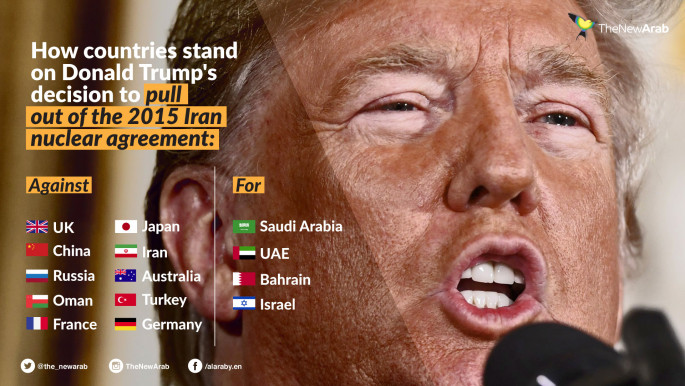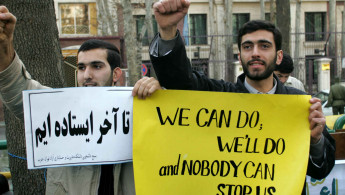Riyal in retrograde: What will the sanctions mean for Iranians and their economy?
However, the repercussions of new sanctions on Iran are expected to shake the global economy too. Not only will access to Iran's much-needed oil supplies be blocked, but also the billions of dollars invested in the Islamic Republic post-2015 by eager international investors keen to capitalise on Iran's educated youth and swelling middle classes.
Many are lamenting an order by Trump's National Security Adviser John Trump to European companies and Arab allies to abandon projects in Iran, or face legal consequences. These threats are powerful. They leave Iranians in a predicament not dissimilar to the one they faced as economic pariahs three years ago, a situation that drove them to strike a deal that curbed their nuclear ambitions.
Oil oscillations
Since the 2012 sanctions began to be eased in 2016, Iran's oil industry has seen the biggest boom of all its economic sectors. It is now expected to take the brunt of a renewed embargo. Iran - sitting on the fourth-largest crude oil reserves in the world - boosted daily production up to around 3.8 million barrels in the second half of 2017, almost one million more barrels per day than in early 2016, according to CNN Money.
Explainer: The landmark 2015 Iran nuclear deal
Prices plummeted as Trump made his announcement, but they soon shot up again. They continued to increase steadily amid regional insecurity, panic stockpiling, and shock at the severity of Trump's stance. The price of Brent oil rose from around $75.50 on Tuesday to $77 per barrel on Wednesday with some predicting it could reach the $80 mark.
 |
Should those sanctions take effect - and key importers of Iranian oil such as the EU begin to reduce those imports. |  |
"Oil prices moved higher on the day as market participants assessed the prospect of US sanctions on companies doing business with Iran. Should those sanctions take effect - and key importers of Iranian oil such as the EU begin to reduce those imports - oil supply will be reduced and prices [will] continue to spike," an oil market analyst told The New Arab.
Although sanctions are not expected to be enforced in the next six months, many are predicting their worldwide repercussions will take hold in the near future.
"The action will drive up oil prices and potentially harm the global economy. By early 2019, sanctions targeting Iran's oil exports could cut global production by up to 1 million (depending on Asian countries' compliance with the US sanctions), adding to strong demand and OPEC cuts," tweeted Henry Smith, political risk analyst at Control Risks.
It is widely recognised, however, that Iran will focus eastwards toward Russia and China, and more positive analyses predict a stable demand from their Asian neighbours, as well as European oil buyers who stay in the deal. This should help keep Iran afloat. Other big oil exporters - such as arch-rival Saudi Arabia, as well as Iraq - will stand to gain from any of Iran's losses.
Trump's attempts to stifle Iranian oil exports could yet be blocked by international law. The US must first prove that the global oil market is adequately supplied before being allowed to impose sanctions. As crude oil approaches a bumper three-year high, some may need to be convinced.
Nevertheless, multi-billion-dollar agreements between France's Total oil and gas firm to develop an Iranian oil field are in peril, along with a burgeoning business partnership, among others.
Trade trouble
Aside from oil, the biggest contracts signed between Iran and new trading partners have been those for air travel, along with cars and tourism. A spate of aviation disasters in Iran reflect the deteriorating quality of Iran's airliners, where decades of sanctions have prevented them from being upgraded or replaced.
"The aircraft sales were among the most sought-after contracts for Iran," said the Washington Post, referring to the multi-billion dollar jet sales agreed between western companies and Iranian airlines.
Despite France insisting it will "do everything" to keep European companies in Iran, aircraft manufacturers are likely to take a hit. US aviation giant Boeing, and French equivalent Airbus, are now set to lose out on a $39 billion deal with Iranian airlines after US Treasury Secretary Steve Mnuchin announced that licenses for companies to sell passenger jets to Iran would be revoked.
 |
| [click to enlarge] |
The automobile industry also faces trouble, with Germany's Volkswagen facing an end to car sales in Iran - a programme it began only in 2017.
As sanctions began to ease, so did entry requirements to Iran in an effort to boost tourism. Travel operators eyed major business opportunities, restoring Iran's position on the tourist trail it lost in the wake of the Islamic Revolution.
Now airlines such as British Airways and Lufthansa, and hotel developers such as France's Accor and Spain's Melia, may have to rethink their ambitious plans for making Tehran a tourist hotspot.
Predicting a riot?
Many Iranians staked their hopes of a better future on the success of the 2015 deal. Before the economy could properly reap the rewards of oil market booms and successful international trade deals, sanctions will likely exacerbate the very problems Iran was shedding through its new-found economic liberty.
Shunned politically and economically by its regional neighbours and the West - who didn't want to boost the coffers of a country they assumed was headstrong on creating nuclear weapons - Iran suffocated. Rocketing unemployment - as well as food and medical shortages - hit its population hard.
Three years on and it was clear that Iran was still not out of the woods. The mass protests that swept the country in December and January were initially sparked by anger over the prices of food and other essentials. Youth unemployment lingers at around 30 percent.
Iran's currency - the riyal - has tumbled over recent months and Iranians are said to be cashing in their savings in order to buy dollars and euros.
Only time will tell if Iran can continue to overcome its economic woes in the face of an American chokehold.
Some predict a wave of re-energised protests as the starved economy takes its toll on the populace. Optimists have faith in a European alliance - united with China and Russia - who could prove strong enough to defy Trump's dramatic foreign policy bulldozing.



